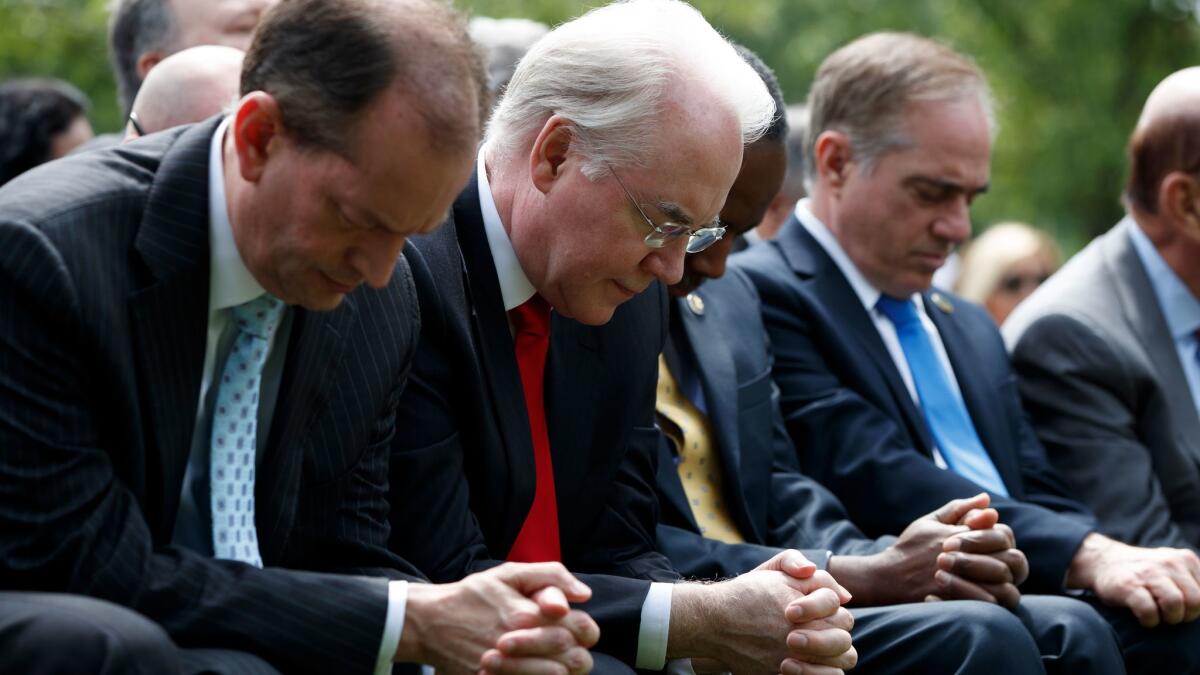Op-Ed: The Trump administration’s alternative Christianity

Evangelicals have never had it so good, politically speaking.
Since President Trump took office in January, the White House has become a Christian roundtable, with just about every top-tier seat filled by a faithful member of the fold or someone who is happy to further the fold’s agenda.
The lineup of believers who are in positions of power is truly dizzying. Betsy DeVos, who leads the Department of Education, has stated that her goal as a public servant is to “advance God’s kingdom.” Secretary of Energy Rick Perry employed mass prayer as a means of addressing social problems when he was governor of Texas. Ben Carson, secretary of Housing and Urban Development, believes that the theory of evolution was encouraged by the devil.
It doesn’t stop there. Atty. Gen. Jeff Sessions has said that people who don’t believe in God can’t be truthful. Scott Pruitt, the Environmental Protection Agency chief, is a devout Baptist who denies that climate change is real. Mike Pompeo, the director of the Central Intelligence Agency, is an evangelical who opposes abortion even in cases of rape. The president’s attorney, Jay Sekulow, another evangelical, has defended school prayer at the Supreme Court, and Trump’s spiritual advisor, Paula White, is a Pentecostal televangelist who teaches that if people give her church thousands of dollars, God will reward them with favors. Vice President Mike Pence might be the most piously anti-gay politician in America.
Jesus loved and protected those who were targeted and deemed outcasts by society’s reactionaries.
What’s really remarkable about this group, however, is not that so many ardent worshippers of Jesus are running the country, but how non-Christian this ostensibly Christian government is proving to be. The Trump administration’s Bible devotees are pushing an agenda that flies in the face of their own savior’s message.
Jesus taught that wealth was deeply problematic, if not inimical to spiritual health, for instance. He preached that a person cannot serve both God and money (Luke 16), that it is nearly impossible for the rich to get into heaven (Matthew 19) and that if you want to be in good graces with the Lord, you ought to support the poor (Matthew 19). It’s those living in poverty, Jesus said, who are truly blessed (Luke 6).
And yet Trump’s appointees are doing all they can to increase the wealth of the wealthy and cut funds and services for the poor. Some of the most supposedly Christian members of the administration have worked the hardest to take away healthcare from millions of poor Americans.
Jesus was big on mercy (Luke 6) and forgiveness (Colossians 3), and was himself tortured and murdered by a brutal regime. Trump and his administration have called for harsher penalties for nonviolent drug offenders and more draconian sentencing in general.
Consider what Jesus taught about violence and weapons: They’re bad. “He who lives by the sword, dies by the sword,” he said (Matthew 26). The White House embraces America’s powerful gun lobby and does so despite terrible mass shootings that have become routine.
Jesus loved and protected those who were targeted and deemed outcasts by society’s reactionaries. But it’s Trump’s associates and other Christian politicians who show the least empathy for gay people, transgender people, Muslims and other vulnerable groups.
Oh, and how about that inn? You know, the one where poor Joseph, and pregnant, unmarried Mary couldn’t get a room (Luke 2). Surely Jesus would welcome the outsiders and refugees of the world to the most wealthy of nations. Yet his most zealous followers in the White House want to keep the poor and persecuted out. No room at this inn, they say. You have to wonder: Do they make such decisions before or after Bible study?
Millions of Christians across the world take the teachings of Jesus seriously, of course. They work in soup kitchens, homeless shelters and orphanages. They help people overcome addiction. They support the most vulnerable, advocate nonviolence and compassion, fight for human rights. They care about the pain climate change will cause. Unfortunately, they are not the Christians running this country.
Many Americans shuddered when Kellyanne Conway used the phrase “alternative facts” to defend White House claims about the size of the crowd at Trump’s inauguration. But the administration’s alternative Christianity may prove just as detrimental as its loose grasp on truth. While these men and women profess love for Jesus, they create suffering and misery in his name.
Phil Zuckerman is a professor of sociology and secular studies at Pitzer College and the author of “Living the Secular Life.”
Follow the Opinion section on Twitter @latimesopinion or Facebook
More to Read
A cure for the common opinion
Get thought-provoking perspectives with our weekly newsletter.
You may occasionally receive promotional content from the Los Angeles Times.










